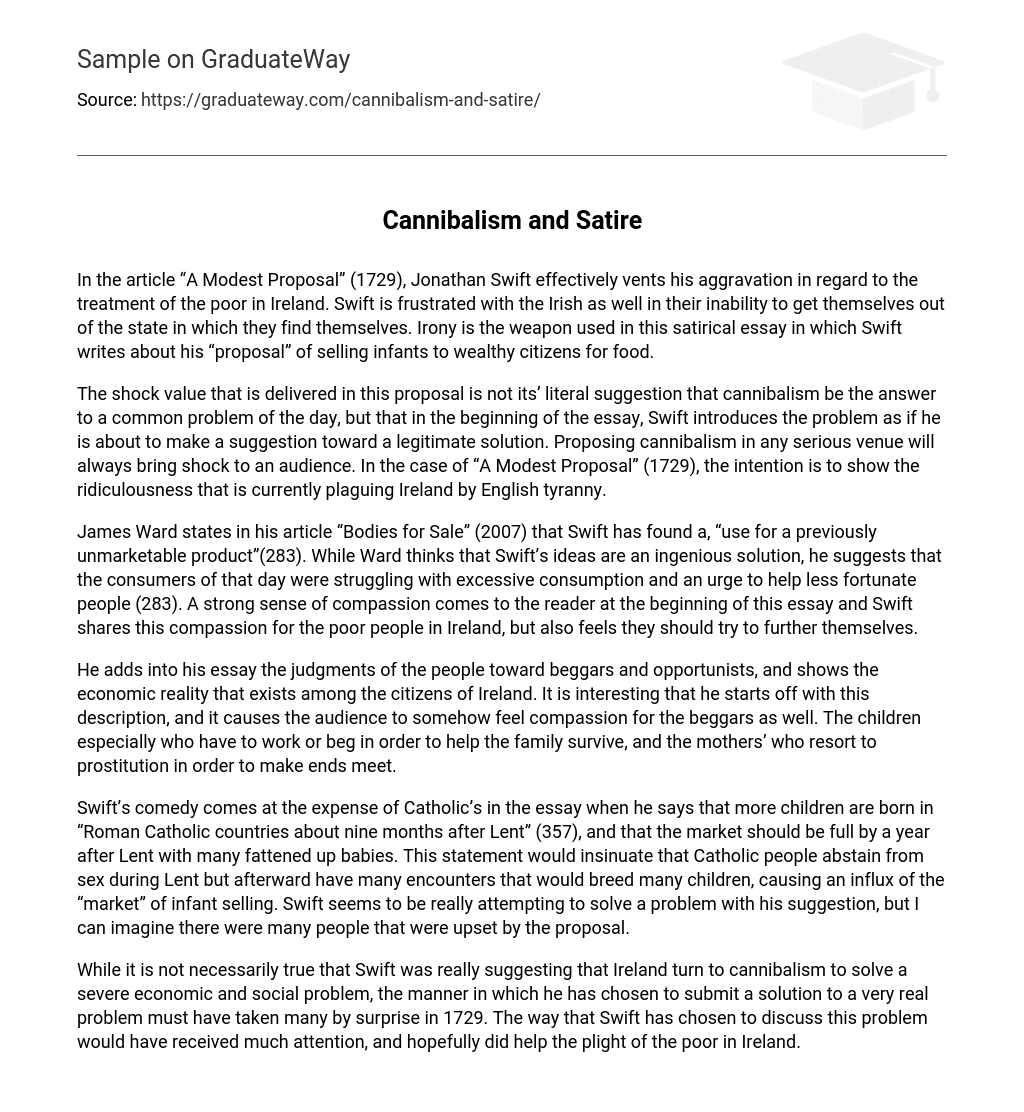Jonathan Swift expresses his frustration with the treatment of the poor in Ireland in his article “A Modest Proposal” (1729). He also criticizes the Irish people for their inability to improve their own situation. Swift uses irony as the main device in this satirical essay, where he presents his “proposal” of selling infants to affluent individuals as food.
The shock factor of this proposal lies not in its actual suggestion to solve a common problem, but in Swift’s initial presentation of the problem as if he is about to offer a valid solution. The mere mention of cannibalism in a serious context will always provoke shock in an audience. In “A Modest Proposal” (1729), Swift uses this approach to highlight the absurdity of the issues Ireland faces under English oppression.
James Ward argues in his article “Bodies for Sale” (2007) that Swift has discovered a way to monetize a product that previously had no market value (283). While Ward acknowledges the brilliance of Swift’s ideas, he also believes that the society of that time was grappling with overconsumption and a desire to aid those in need (283). This essay evokes a profound sense of compassion from its audience, with Swift sharing this sentiment towards the impoverished people of Ireland while also advocating for their personal growth.
Adding the judgments of people towards beggars and opportunists, the author highlights the economic reality among the citizens of Ireland in his essay. The initial description invokes compassion for beggars. It particularly focuses on children who are forced to work or beg to support their families, and mothers who turn to prostitution to make ends meet.
In his essay, Swift uses comedy to criticize Catholics, suggesting that a large number of babies are born in Roman Catholic countries about nine months after Lent. He humorously proposes that the market for selling infants should be well-stocked with plump babies within a year after Lent. This implies that Catholic individuals abstain from sex during Lent but engage in numerous encounters afterwards, resulting in a surplus of infants available for sale. Although Swift’s intention appears to be problem-solving, it is likely that his suggestion upset many people.
Although it may not be accurate to say that Swift actually proposed cannibalism as a solution to Ireland’s severe economic and social issue, his unconventional approach to addressing a real problem in 1729 must have surprised many. Swift’s method of discussing the problem likely garnered significant attention and hopefully brought some relief to the impoverished in Ireland. It was necessary to make the wealthy aware of the socioeconomic problem that they were not only exacerbating but also not alleviating.
Swift skillfully incorporates humor to effectively address a significant issue in Ireland and potentially worldwide during that era. While some critics may have assumed he wrote this essay for personal gain, Swift’s decision to remain anonymous disproves such speculation. By adopting a distinct persona, he exposes certain traits that he otherwise struggles to reveal.
The persona or “proposer” may be perceived by the audience as cold-hearted and superficial, but this is precisely what captures the attention of Swift’s intended audience. It ensures that more individuals will read it in an effort to comprehend the nature of the individual who would propose such an idea.
References
Swift, J. (1729). A modest proposal. In A. T. Rottenberg, & D. Haisty Winchell (Eds.), Elements of argument (9th ed., pp. 116-119). Boston, MA: Bedford/St. Martin’s
Ward, J. (2007). Bodies for sale. In Irish Studies Review, 15(3), 283-294. doi:10.1080/09670880701461811





